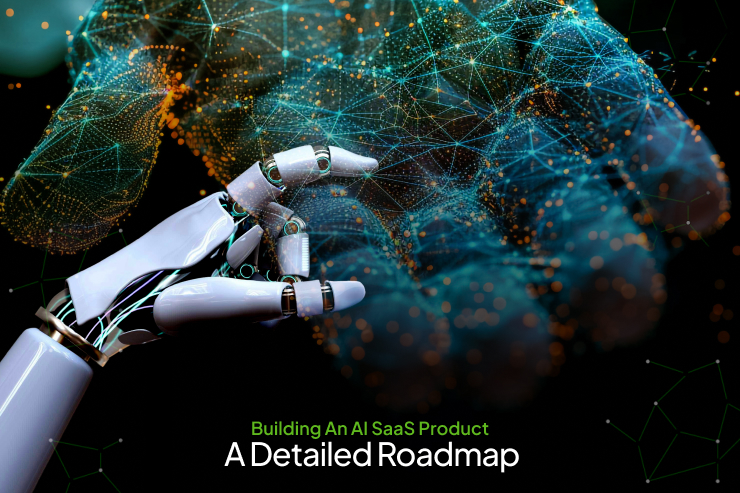A.I. is Innovating the Developer Experience, GitHub Survey Reveals News, Software Development

A recent survey by GitHub (in association with Wakefield Research) discovered that artificial intelligence development services facilitate organizations to enhance their developer experience to drive innovation and make a lasting impact in modern-day software development.
The survey of 500 US-based developers (in companies with more than 1000 employees) identifies that the ideal way to inspire growth is by improving productivity, enhancing satisfaction, and enabling development teams daily.
A.I.’s Impact on the Developer Experience: Five Key Findings from the Survey
A.I. is readily assisting developers to accomplish routine tasks and build better code through its many generative applications like ChatGPT. Artificially intelligent tools are already enhancing the developer experience in organizations with improved code delivery, documentation, collaboration, and code reviews, writes growth marketer Ruth Mansfield.
Wakefield Research concluded with five key findings in their survey:
-
- 92% of U.S. developers use A.I. coding tools professionally & personally, enhancing their work/life experience.
- Developers identified that waiting on build & test reviews remains the most time-consuming task during the development lifecycle, even with the investment in DevOps.
- Surveyed developers also identify collaboration as a top concern for them when working with larger teams and should be a leading metric during performance reviews.
- 80% of developers expect A.I. tools will optimize team collaboration.
- 70% of developers believe that A.I. coding tools are a great advantage at work that facilitates better code quality, faster task completion, and resolving events.
The Developer Experience
Professionals describe developer experience as the ‘feelings & perceptions’ developers have when working on technical products and collaborating with stakeholders. GitHub defines the developer experience as “the ease or difficulty to perform their core tasks needed to implement changes.”
The GitHub team established that the survey was conducted to understand the developer experience better. The research was performed to pinpoint vital tactics that organizations utilize to empower development teams.
GitHub contributor Inbal Shani discusses that growth starts by investing in better developer experiences. The study determines that collaboration is the multiplier that makes development teams more productive, effective, and satisfied in organizations.
Source: Github
As times evolve, organizations increasingly focus on their developer experience to improve software quality and quickly reduce developer burnout. The emphasis on quality is consistently increasing instead of only prioritizing cost reduction.
Experts suggest that settings goals & objectives around the development are an excellent way to inspire a positive developer experience. Setting revenue growth, better end-user UX, improved quality of new releases, and efficiency directly affect the developer experience.
Collaboration: The Key Multiplier of the Developer Experience
Developers have the innate need to feel ownership and responsibility over their software; this is where collaboration comes into the process. Positive DevEx organizations collaborate & communicate constantly with their developers to create a stable environment, asking them for feedback and complementing their contribution towards projects.
Survey participants identified several factors (top 3 factors ranked for 500 developers) that make collaboration more effective:
Source: Github
Developers Have Spoken, Collaboration is King!
33% of surveyed developers identify that collaboration & communication are just as important metrics as code quality. The latest tech stacks can be confusing and may weigh down on the development team. Hence, collaboration with senior developers can enhance the focus and optimize the experience of developers in real-time through mentorship.
Another essential to effective team collaboration is planning and requirement gathering meetings that greatly impact how teams come together and collaborate. Apart from making collaboration effective, planning meetings play a major role in building precise products to appease all project stakeholders.
Since planning & requirement meetings bring cross-functional teams together, they increase the success rate of projects, hence reducing systemic risks. Collaborating through regular meetings also keeps teams on schedule and budget, ensuring development teams know when escalations might occur.
The survey discovered that, on average, 52% of development professionals collaborate with 21 other developers daily or weekly. Collaboration is not only talking & attending meetings, but also undisturbed continuous workflows, fully configured work environments, and formal mentorship
Ready To Harness the Power of Artificial Intelligence & Big Data?
Let's ConnectUndisturbed Workflows
30% of developers responded that quiet work time is a major part of their routine, while 32% believe it positively impacts their overall experience. Specified blocks of time with no team communication are critical for developers to focus on writing code and work towards team objectives.
Fully configured Developer Environments
A fully configured developer environment is also necessary for any particular project. The developer environment promotes consistency throughout the product lifecycle, even when the software is readily deployed. Developers can collaborate easily & quickly, and by creating effective staging servers (part of the developer environment), they can avoid arguing with end-users over software performance or functionality.
Formal Mentorship
Finally, mentorship remains one of the most critical collaboration principles that allows developers to expand their technical skills and nurtures interpersonal skills that magnify the collaborative culture. 33% of respondents agreed that formal mentorship relationships are most effective for team collaboration.
How Artificial Intelligence Improves Collaboration & Builds Positive Developer Experiences
So, here is what we know.
One, developers demand growth opportunities to enhance their experience, but they feel these opportunities are limited by the number of tasks they are performing. Collaboration is a ‘multiplier’ of the developer experience and helps developers thrive in their work environments.
With 92% of development professionals already integrating artificial intelligence into their work routines, it is evident that A.I. offers considerable benefits for developers. Surveyed developers also claim that artificial intelligence tools are improving code quality, delivering faster outputs, and leading to fewer production-level incidents.
Source: Github
Developing Coding Skills with AI
A resounding 57% of developers identify that A.I. tools are assisting them in developing coding skills. A.I. coding assistants deliver unparalleled convenience, support, and learning to developers by easily integrating with their popular code editing tools.
These intuitive assistants also offer the ability to generate code snippets from simple comments and can complete coding projects in real-time. Developers are increasingly leveraging A.I. coding assistants like GitHub Copilot to learn new coding languages, detect bugs & errors, and seek support for routine tasks.
In older research, GitHub identified that 87% of developers using GitHub Copilot preserved mental effort when completing repetitive tasks. By reducing this cognitive effort, A.I. assistants allow developers to focus on more complex tasks and pave the way for innovation. Moreover, the renowned ChatGPT is widely used to generate code snippets and learn coding environments and critical suggestions within seconds.
Enhance Developer Productivity
We already know that the expectations for high-quality software & applications burden developers to be quicker and more accurate with their coding tasks.
With 53% of developers identifying that A.I. assists them to be more productive, we can already conclude that it’s working. Popular solutions like Deep Code, ChatGPT, Notion A.I., etc., are increasingly transforming project management leading to better decision-making and improved collaboration.
A.I. productivity tools actively allow developers to automate repetitive tasks like planning & scheduling meetings, delegating tasks, and automatically getting task progress notifications. In the figure above, 51% of developers identify that A.I. assistance allows them to build instead of working on mundane tasks.
Reducing the number of tasks enables project managers & developers to improve accuracy while streamlining communication between cross-functional teams through auto-notifications.
Another significant perk of leveraging A.I. in development is the invaluable predictive analyses that can assist project management and development teams. Project managers can easily identify potential issues, errors & incidents and resolve them instantly. This proactive approach towards project management delivers higher productivity and control over the entire development lifecycle.
Get in Touch To Learn How A.I. Can Solve Your Business Needs
Let's ConnectPrevent Burnout
A recent study from UIPath concluded that 58% of professionals (worldwide) believe A.I. automation improves job fulfilment (developer experience) and can address burnout. Similarly, the GitHub survey reports that 41% of US-based developers identify that A.I. automation tools prevent burnout.
As an immensely time-intensive function, software development is generally a high-pressure occupation with increasing demands for quality, accuracy, security, and functionality. Testing has already become an ongoing process within the software development lifecycle, but testing & review itself can take hours.
Integrating A.I. automation into the testing process can significantly reduce manual testing hours, which can be spent on innovating solutions. Popular A.I. tools, including Applitools, Appvance, & Mabl, are widely used by devs and testing teams to automatically quality-assure software. In my focus group discussion with Progatix mobile app developers, they identified that it takes almost 50 minutes to generate and execute a normal test case.
A.I. tools even identify errors & bugs before they are moved on to the Q.A. team, allowing quicker resolutions and savings work hours for both teams. Developers & testing experts easily bypass repetitive tasks, allowing them to focus on activities that positively impact them.
Therefore, by eliminating repetitive tasks saving time, and reducing human effort, A.I. tools massively impact the developer experience.
Rethink Collaboration
Prominent virtual assistants & chatbot technology are already enabling enterprises to simplify and strategize their internal communication design. By integrating project management, email, and chatbot A.I., development teams can easily handle multiple routine inquiries, schedule meetings automatically, and support knowledge dissemination without having to stress out & burn out development teams with menial tasks.
Choosing the Right Performance Metrics When Using A.I. Tools Matters
The survey determines that developers are not convinced with their current performance metrics. The top five developer metrics that are currently used for performance management identified in the survey include:
Source: Github
When the same sample of 500 developers was asked which metrics should be used to measure performance when A.I. tools are used, they responded as follows:
Source: Github
Quality vs Quantity
Developers identified that the number of bugs & issues resolved are primarily linked with software performance; hence, it should not be a metric to assess their performance. Professionals discuss that quality code must therefore be the priority over the quantity of code written.
More Code v Low Code
Experienced developers have already identified that writing more code doesn’t necessarily translate to quality code in most cases. Lines of code (LoC) written is already a controversial, deceptive metric when measuring developer productivity. Professional developer Alex Circei discusses that LoC is a vanity metric and does not signify progress.
LoC is extensively used since it is easier to measure, but it is a negative behaviour that increases code complexity, creates less efficient code, and is not cohesive with the software’s functionality. Remember that developers who write fewer lines of code can be much more productive than those who develop more.
Build Machine Learning Enterprise Solutions With Our Professional Team
Let's ConnectOn The Clock
Measuring developer performance by the time taken to complete coding tasks overlooks the crucial responsibilities of developers, writes lead developer Nathan Bibler. Productive developers are those who gather & disseminate important information, identify & eradicate team roadblocks, and enable their team to focus on the solution.
Oops…
Evaluating development team performance against the number of production incidents is not the ideal performance metric in most organizations, claim numerous professionals. Progatix senior developers establish that instead of using the number of incidents as a metric, we consider measuring cost-savings generated, ROI growth, code quality, time savings, etc.
Ramki Ramaswamy (CTO, CIO, & CTDO Pretium) agrees with our team’s perspective and discusses that “development productivity should ideally be measured in value (return, opportunity, operational savings) per dollar spent versus risk (security, opportunity) of doing nothing.”
Developers Demand Opportunities to Grow
The GitHub survey identified that for superior developer experience, organizations must make room for developers to grow. To better understand what developers identify as positively impacting their growth, we conducted focus group research with 10 of our brightest minds.
Senior Progatix developers identify that by minimizing work interruptions, improving the management of technical processes, giving developers autonomy, properly configuring development environments, investing in learning, investing in the latest tools (irrespective of cost), and building ongoing feedback loops with development teams are strategic ways to streamline the developer experience.
Before we head on to the survey’s findings on what developers feel positively impacts their experience, let’s look at tasks the 500 surveyed developers spend most of their time on.
Source: Github
So, when the same developers were asked which tasks make a positive impact on their workday, this is what GitHub discovered:
If you notice, the responses closely match what our development team identified in the focus group. But with most of the developers’ time spent writing, testing and getting code reviewed, there is less room for positive impact activities. With developers busy in truly what our team claims is a “hectic” work routine, organizations must find ways to build more positive development experiences.
Connect with Progatix for Groundbreaking A.I. Assistance & Project Management Solutions
Progatix is a professional custom software development, digital consultancy, and I.T. services management company with over two decades of prestigious experience. We host a remarkable team of full-stack, front-end, and back-end developers who have built world-class AI-powered enterprise solutions.
Our team has built innovation-driven A.I. chatbot solutions, content management systems, ERP, CRM, project management, and many other tools to facilitate development teams. Connect with our business advisors today to learn how we can help your organization be more productive, collaborative, and efficient with artificial intelligence solutions.

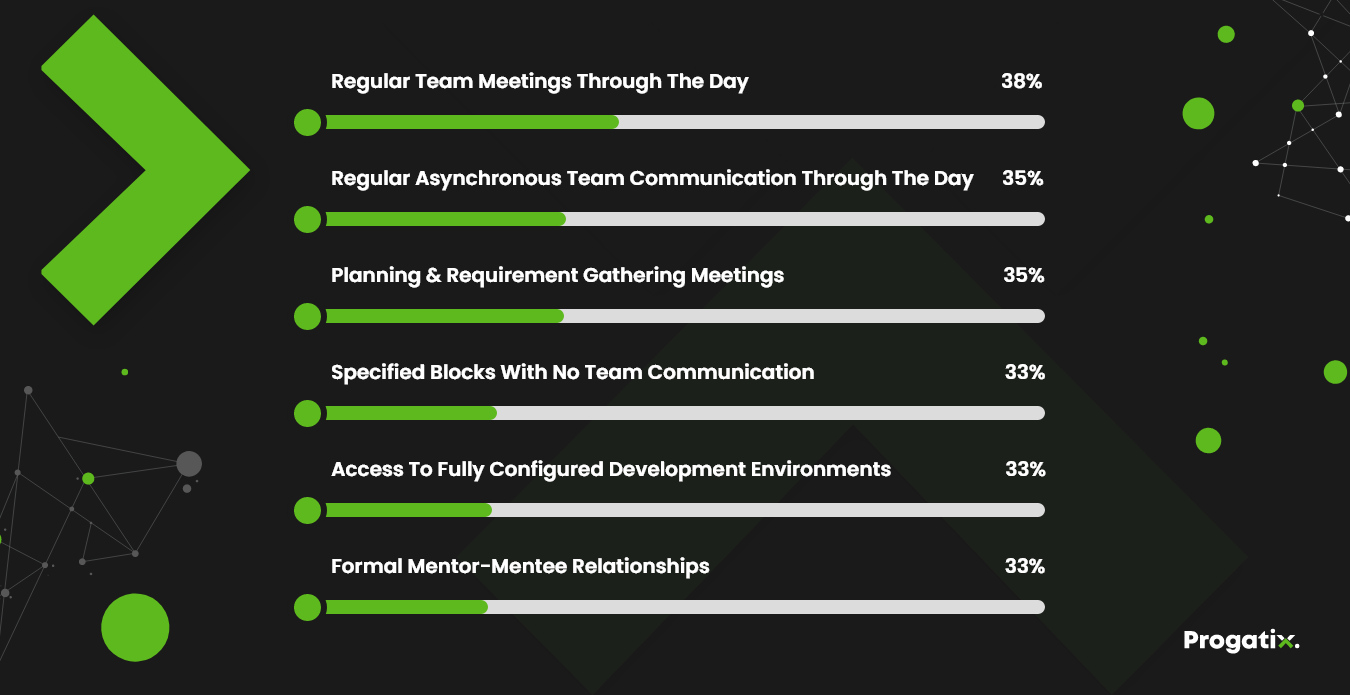
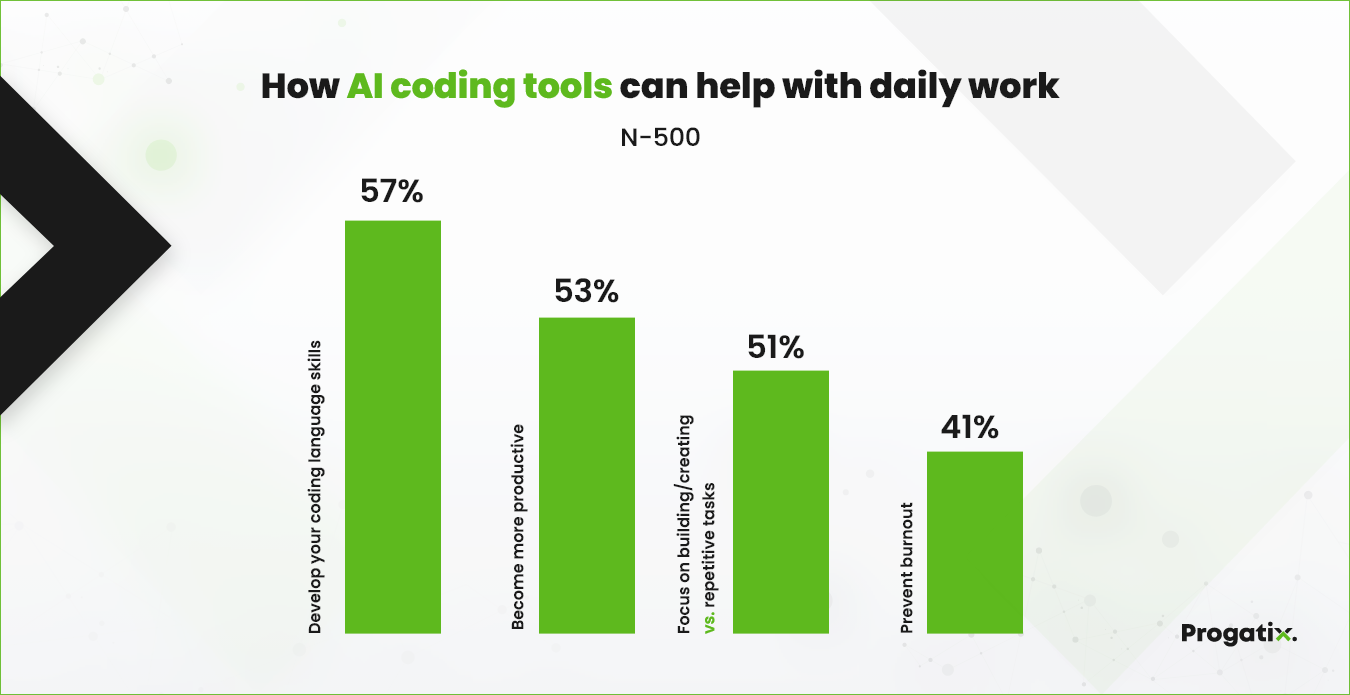
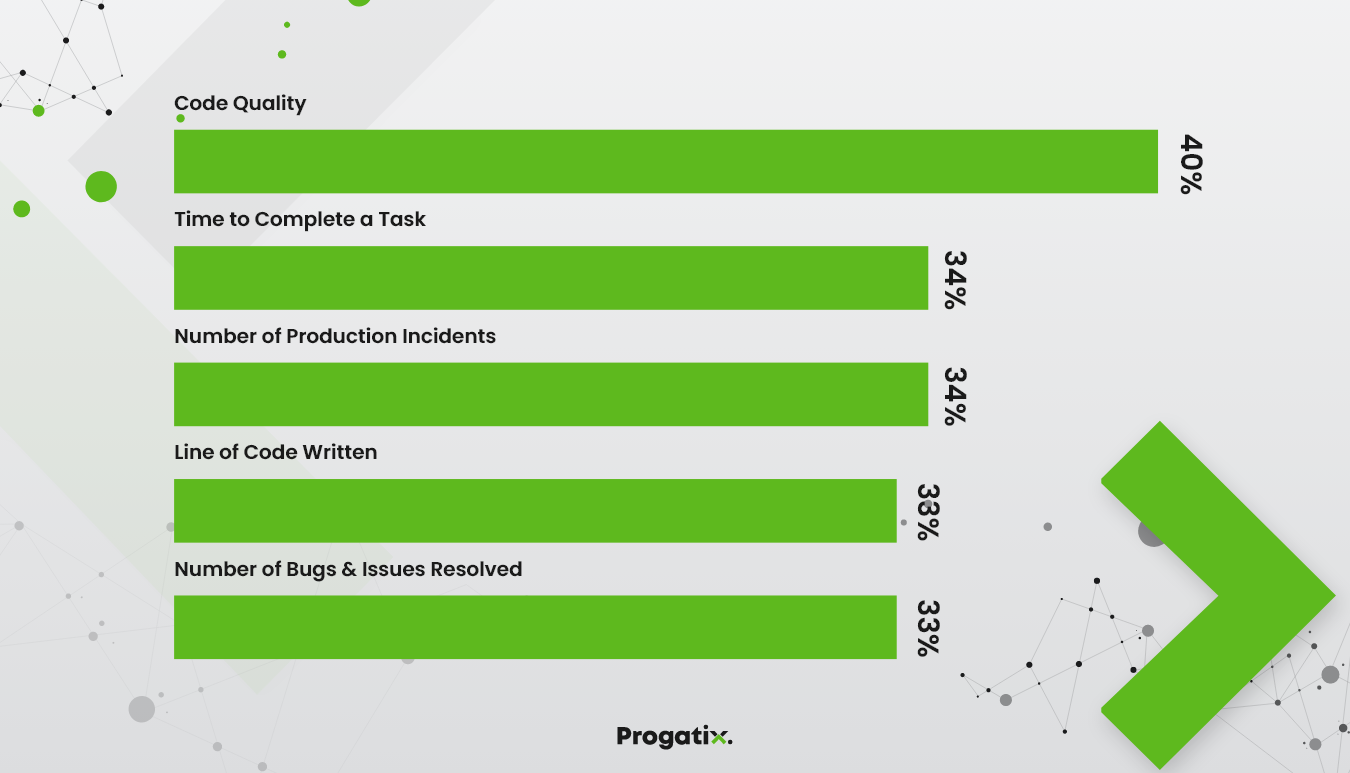
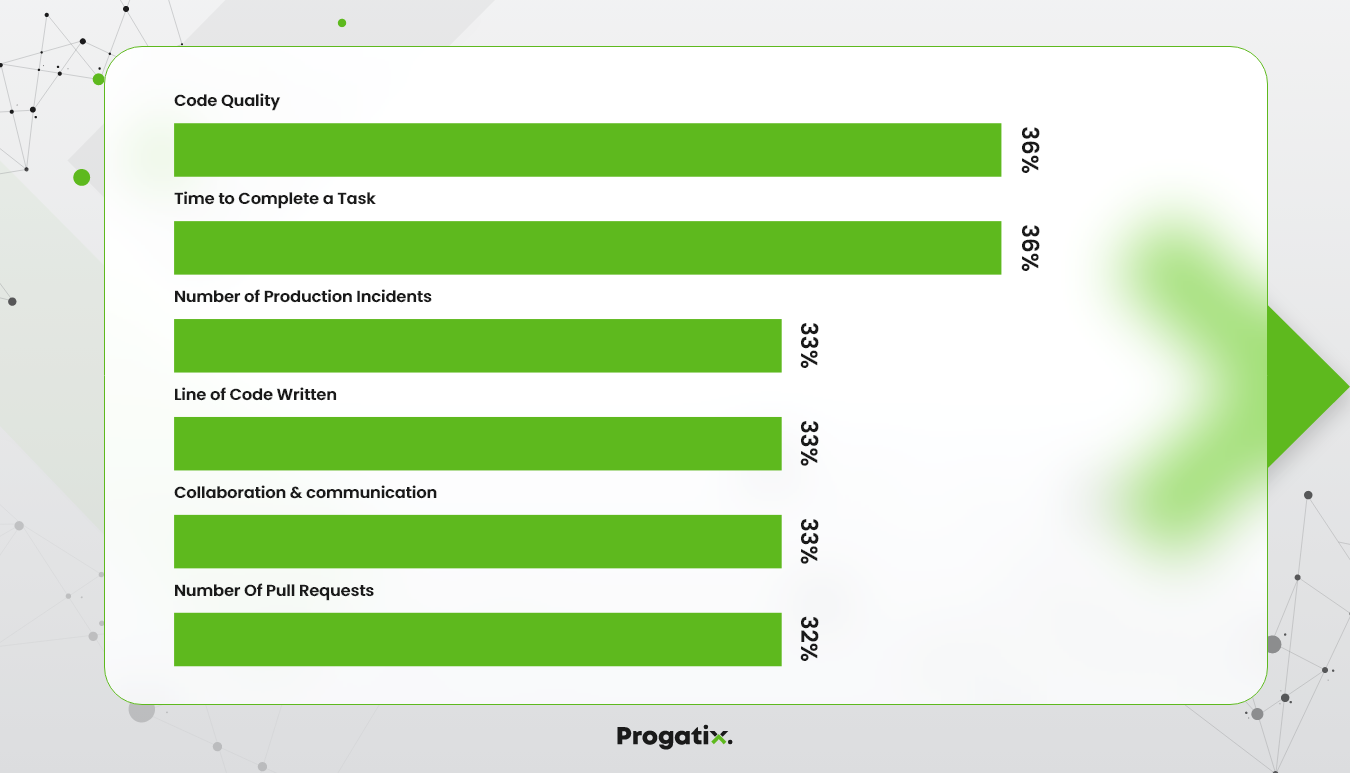
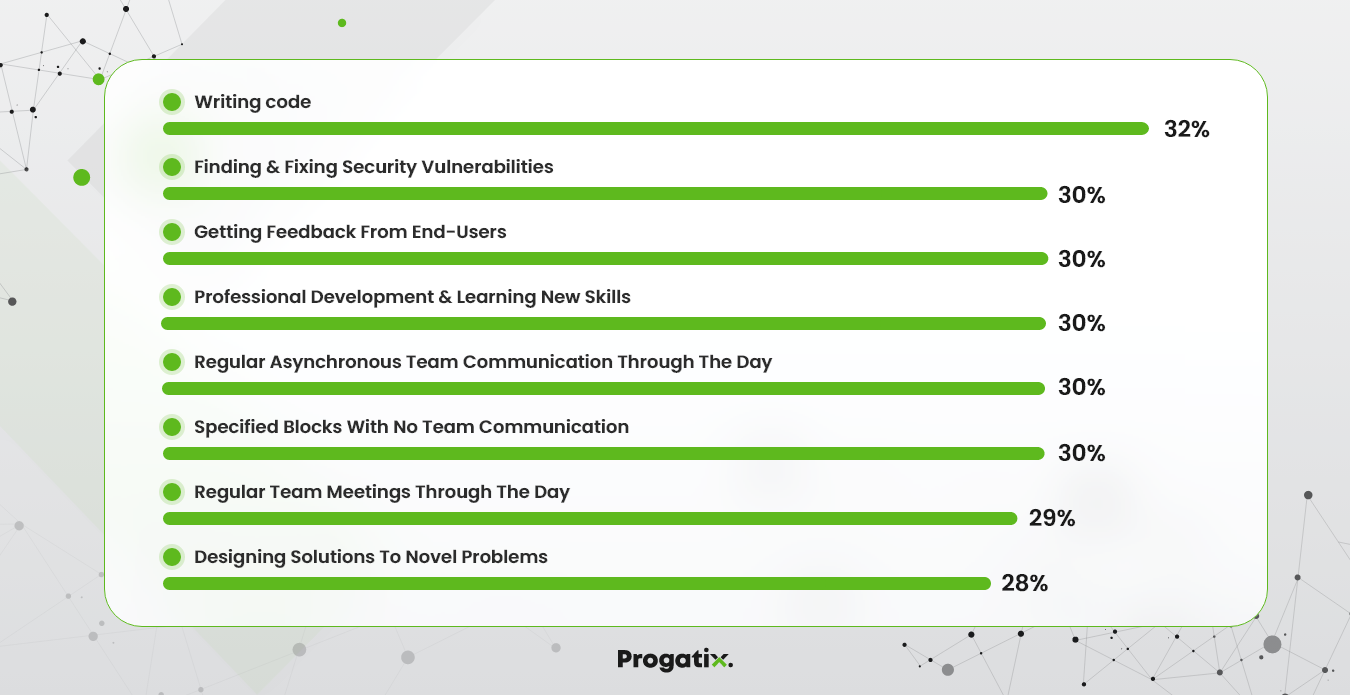


 Let's Discuss Your Tech Solutions
Let's Discuss Your Tech Solutions 

